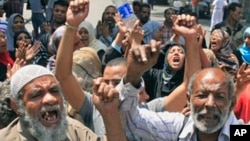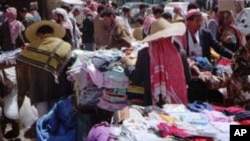WASHINGTON —
Activists in much of the Arab world often risked their lives two years ago to change what they considered to be outmoded, unresponsive and sometimes authoritarian political systems.
The movement, which came to be known as “the Arab Spring,” did manage to dislodge several long-standing regimes – Moammar Gadhafi’s 42-year rule in Libya, Ali Abdullah Saleh’s 33 years in power in Yemen and Hosni Mubarak’s 30 years running Egypt. It also triggered a bloody civil war that threatens the 41-year Assad family dynasty in Syria.
But what the Arab Spring hasn’t done – at least not so far – is to bring about positive changes in the economies and social development in the North African and Middle East nations whose politics it most transformed.
Some of the Arab countries, Egypt and Tunisia are examples, share common socioeconomic challenges – large budget deficits that preclude large-scale public spending on stimulate the overall economy. Public spending in these countries remains focused on financing public salaries and subsidies on common consumer products.
Another big problem, according to Nemat Shafik, deputy managing director of the International Monetary Fund, is that Arab Spring countries haven’t decided what kind of economy they are trying to create.
Unlike East European countries that chose the European Union’s economic model following the collapse of the Soviet Union two decades ago, Shafik says Arab Spring countries still don’t have a clear vision of their economic future.
"Much of the uncertainty that we see now is a reflection of the lack of consensus about a role model for economic strategy or political strategy of what the destination point is," she said during a recent seminar at the Carnegie Endowment for International Peace in Washington.
This lack of a clear, coherent economic vision, however aspirational, is a problem throughout the Arab Spring nations, according to Ibrahim Saif, a senior associate at the Carnegie Middle East Center in Beirut. He says it creates a climate of insecurity that affects all sectors of an economy.
"The tourism industry, for example, which is viewed as the most important contributor to foreign currency inflows and job opportunities, has been hit particularly hard by the security gap," Saif said.
Bread or freedom first
But Marwan Muasher, a scholar at the Carnegie Endowment for International Peace, says the Arab Spring nations need to work on political reform as much as reforming their economies.
"It is difficult to encourage foreign investment if there is no independent judicial system," Muasher says. "And it is hard to curtail corruption without an independent press or a strong parliamentary system."
The IMF’s Shafik says the political reforms must be applied in all areas of government as well as civil society.
"Business environments should stop favoring privileged groups; economy has to be more export-oriented; education and labor skills have to be improved and untargeted subsidies should move away to a modern social safety net targeting the poor,” she said.
Shafik said the IMF has already restructured its loan policies to reflect those requirements. Loan recipients must now revamp untargeted consumer subsidies that are not helping the poor, but instead end up helping the established better off classes. As an example, she cited subsidized fuel prices.
According to the International Energy Agency, the Middle East and North Africa regions accounted for almost two-thirds of petroleum price subsidies worldwide in 2009.
"Most of the price subsidies in the world are in this region… as many countries elsewhere have abandoned price subsides and moved to better systems of social protection," Shafik said. Such untargeted subsidies eat up up 22 percent of government revenues, she adds.
"There are many ways to target the poor, either by subsidizing the goods that poor people consume, targeting regions where the poor people live, or by providing cash transfers or coupons," Shafik said.
Where is the money?
Fixing the situation would require an enormous amount of money, money that simply is not available.
The IMF estimates Arab Spring nations would need more than $160 billion over the next three years to jumpstart their economies – this at a time when they are in political turmoil and commodity prices are rising.
The United States recently released $250 million of a $1 billion economic relief package to Egypt to help the Egyptian government get an IMF loan.
But Muasher notes that this is an exception and a tiny sliver of what’s needed. Western donor countries as well as the IMF, he says, are not in a position to offer much more because of the global economic decline.
Bessma Momani, a senior fellow at the Center for International Governance Innovation in Waterloo, Ontario, expects financing to be the toughest challenge.
"There is some view that perhaps a portion of the needed investment could come from the emerging market economies of Brazil, Russia, India and China," Momani said. "From the Middle East side, investment could come from capital-rich Turkey and the Gulf countries."
But she emphasized that none of this needed foreign investment will be possible unless the Arab Spring nations achieve some measure of political stability. And in some countries, such as Egypt, she said there are even factions discouraging outside investment for fear of political interference.
The movement, which came to be known as “the Arab Spring,” did manage to dislodge several long-standing regimes – Moammar Gadhafi’s 42-year rule in Libya, Ali Abdullah Saleh’s 33 years in power in Yemen and Hosni Mubarak’s 30 years running Egypt. It also triggered a bloody civil war that threatens the 41-year Assad family dynasty in Syria.
But what the Arab Spring hasn’t done – at least not so far – is to bring about positive changes in the economies and social development in the North African and Middle East nations whose politics it most transformed.
Some of the Arab countries, Egypt and Tunisia are examples, share common socioeconomic challenges – large budget deficits that preclude large-scale public spending on stimulate the overall economy. Public spending in these countries remains focused on financing public salaries and subsidies on common consumer products.
Another big problem, according to Nemat Shafik, deputy managing director of the International Monetary Fund, is that Arab Spring countries haven’t decided what kind of economy they are trying to create.
Unlike East European countries that chose the European Union’s economic model following the collapse of the Soviet Union two decades ago, Shafik says Arab Spring countries still don’t have a clear vision of their economic future.
"Much of the uncertainty that we see now is a reflection of the lack of consensus about a role model for economic strategy or political strategy of what the destination point is," she said during a recent seminar at the Carnegie Endowment for International Peace in Washington.
This lack of a clear, coherent economic vision, however aspirational, is a problem throughout the Arab Spring nations, according to Ibrahim Saif, a senior associate at the Carnegie Middle East Center in Beirut. He says it creates a climate of insecurity that affects all sectors of an economy.
"The tourism industry, for example, which is viewed as the most important contributor to foreign currency inflows and job opportunities, has been hit particularly hard by the security gap," Saif said.
Bread or freedom first
But Marwan Muasher, a scholar at the Carnegie Endowment for International Peace, says the Arab Spring nations need to work on political reform as much as reforming their economies.
"It is difficult to encourage foreign investment if there is no independent judicial system," Muasher says. "And it is hard to curtail corruption without an independent press or a strong parliamentary system."
The IMF’s Shafik says the political reforms must be applied in all areas of government as well as civil society.
"Business environments should stop favoring privileged groups; economy has to be more export-oriented; education and labor skills have to be improved and untargeted subsidies should move away to a modern social safety net targeting the poor,” she said.
Shafik said the IMF has already restructured its loan policies to reflect those requirements. Loan recipients must now revamp untargeted consumer subsidies that are not helping the poor, but instead end up helping the established better off classes. As an example, she cited subsidized fuel prices.
According to the International Energy Agency, the Middle East and North Africa regions accounted for almost two-thirds of petroleum price subsidies worldwide in 2009.
"Most of the price subsidies in the world are in this region… as many countries elsewhere have abandoned price subsides and moved to better systems of social protection," Shafik said. Such untargeted subsidies eat up up 22 percent of government revenues, she adds.
"There are many ways to target the poor, either by subsidizing the goods that poor people consume, targeting regions where the poor people live, or by providing cash transfers or coupons," Shafik said.
Where is the money?
Fixing the situation would require an enormous amount of money, money that simply is not available.
The IMF estimates Arab Spring nations would need more than $160 billion over the next three years to jumpstart their economies – this at a time when they are in political turmoil and commodity prices are rising.
The United States recently released $250 million of a $1 billion economic relief package to Egypt to help the Egyptian government get an IMF loan.
But Muasher notes that this is an exception and a tiny sliver of what’s needed. Western donor countries as well as the IMF, he says, are not in a position to offer much more because of the global economic decline.
Bessma Momani, a senior fellow at the Center for International Governance Innovation in Waterloo, Ontario, expects financing to be the toughest challenge.
"There is some view that perhaps a portion of the needed investment could come from the emerging market economies of Brazil, Russia, India and China," Momani said. "From the Middle East side, investment could come from capital-rich Turkey and the Gulf countries."
But she emphasized that none of this needed foreign investment will be possible unless the Arab Spring nations achieve some measure of political stability. And in some countries, such as Egypt, she said there are even factions discouraging outside investment for fear of political interference.





